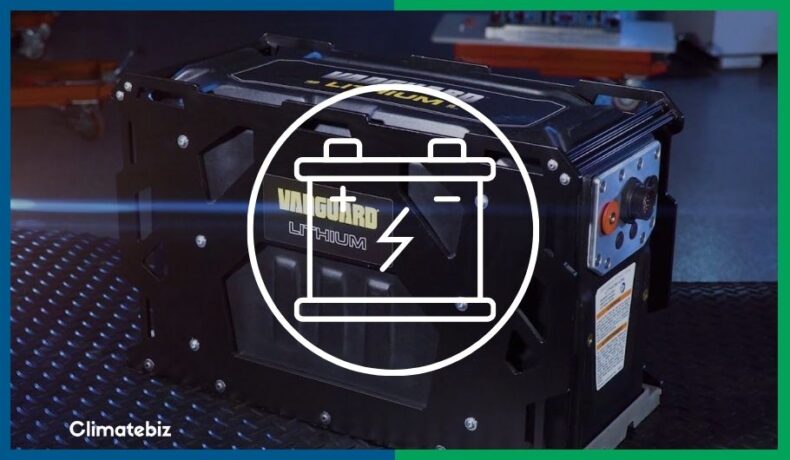Considering buying a 5 kWh battery and want to learn more about it? You’ve come to the right place!
A 5 KWh (kilowatt-hour) battery is a rechargeable battery that is often used in backup power systems. This battery is typically made up of LiFePO4 cells, but you’ll also find lead-acid (AGM) or other lithium-ion options.
Generally speaking, these batteries provide enough power to run a small appliance for several hours or recharge a smartphone multiple times.
For many people, a 5 kWh battery is a great way to have backup power in an emergency. You can use it to run essential appliances such as refrigerators and lights.
A 5 kWh battery can also be helpful if you live in a rural area where the power grid is not always reliable. Additionally, you can pair a 5 kWh battery with a solar array to create an off-grid power system.
If you’re considering purchasing a 5 kWh battery, you should keep a few things in mind.
This article covers everything you need to know about 5 kWh batteries. We’ll discuss how much they cost, their average weight, how long they can last, and if they can power a house.
Table of Contents
What Is A 5 kWh Battery?
A 5 kWh battery is like any rechargeable battery, but with 5 kilowatt-hours of energy capacity.
Energy capacity is just another way to express battery capacity, usually given in Ah (Amp-hours).
The unit for energy capacity is Wh (watt-hours), indicating how much energy a battery can store/provide.
Therefore, a 5 kWh battery can store/deliver 5 kWh (5000 Wh) in ideal conditions.
In reality, capacity losses inevitably occur during charging and discharging processes. However, if you use your 5 kWh battery correctly, you can get pretty close to its advertised capacity.
Design
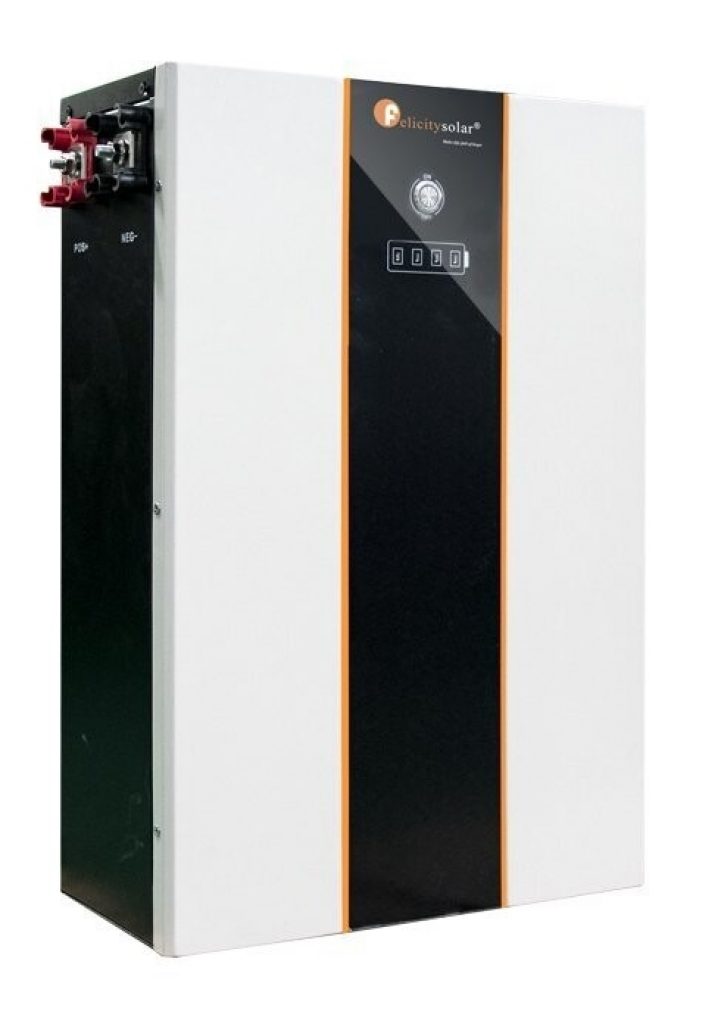
Source: felicitysolar.com
Most 5 kWh batteries look like this, with a clean, simple, and compact design. They can be wall-mounted or floor-mounted, and they’re usually easy to install.
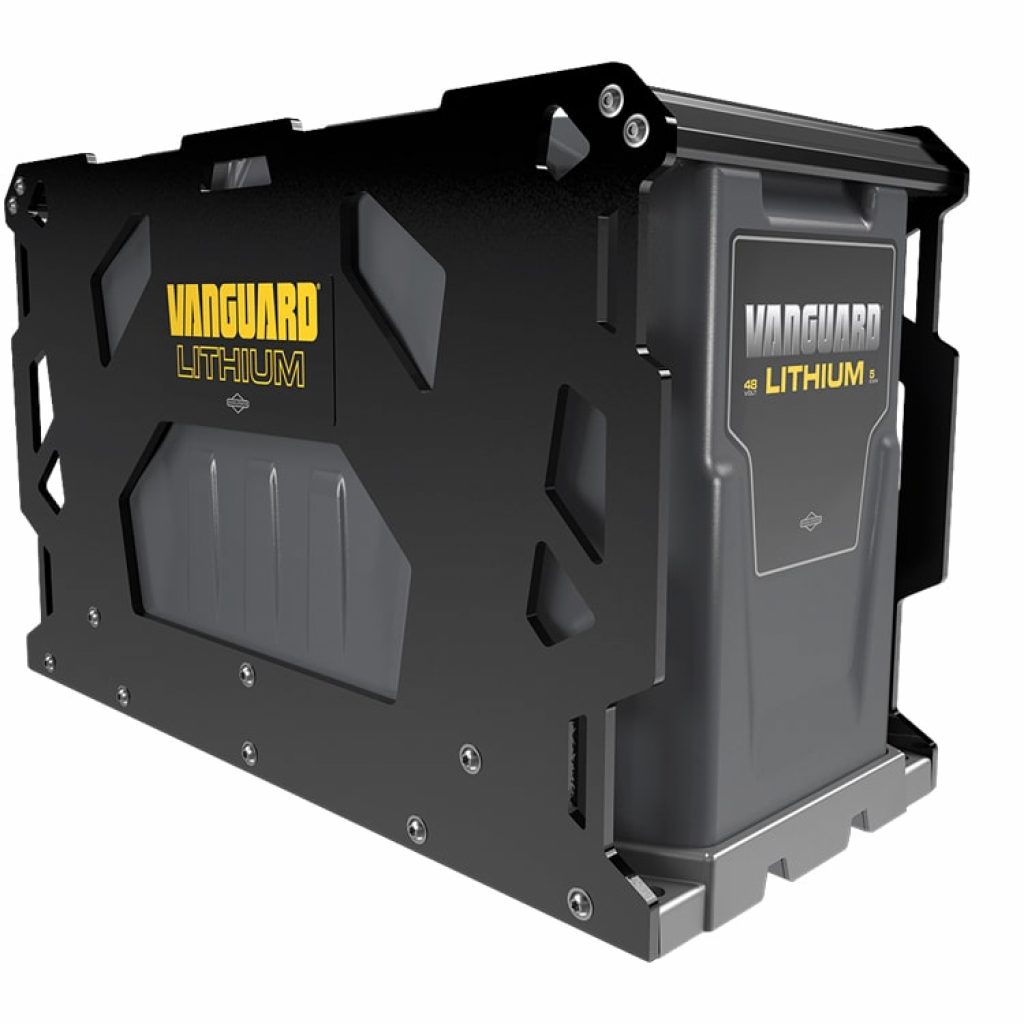
Source: vanguardpower.com
However, there are 5 kWh batteries in the market with a more robust design, such as this lithium battery from the brand Vanguard.
What’s The Voltage Of A 5 kWh Battery?
A 5 kWh battery doesn’t tell you much about its voltage. Wh is a product of capacity (Ah), and voltage (V), so many combinations of common battery voltages and capacities would result in a 5 kWh battery.
But there is a more common combination. Let’s see which one it is.
The relation between Wh, Ah, and voltage is given by:
Energy capacity (Wh) = Voltage (V) x Amp-hours (Ah)
The most common voltage for a 5 kWh battery system, or any battery with a high energy capacity, is 48V.
Why? Because with such high voltage (with many cells in series), you can achieve a high energy capacity (Wh) with a low charge capacity (Ah).
Example
For instance, for a 12V battery system, you’d require a battery with a high charge capacity to achieve 5 kWh. Let’s see how many Ah you’d require:
If Energy capacity (Wh) = Voltage (V) x Amp-hours (Ah)
Then Amp-hours (Ah) = energy capacity (Wh) / Voltage (V)
So, you’d require a battery with: Amp-hours (Ah) = 5 kWh / 12 V = 416 Ah
Since the charge capacity (Ah) is directly related to the amount of material contained in a battery, a battery with 416 Ah would be a very large and heavy battery.
Given the purpose of a 5kWh battery — to provide an easy solution for backup power systems — a big and heavy battery isn’t so practical.
With a 48V battery, however, you’d achieve 5 kWh with a charge capacity of:
Amp-hours (Ah) = 5 kWh / 48 V = 104 Ah
This charge capacity is relatively low, and a 48V 104Ah battery isn’t so big and heavy. It would provide a high energy capacity while taking very little space. What’s more, transportation and installation would be much easier.
For these reasons, 5 kWh batteries usually have the following specs:
- 48V (nominal voltage is around 51.2V)
- 100Ah
Resulting in approximately 5 kWh.
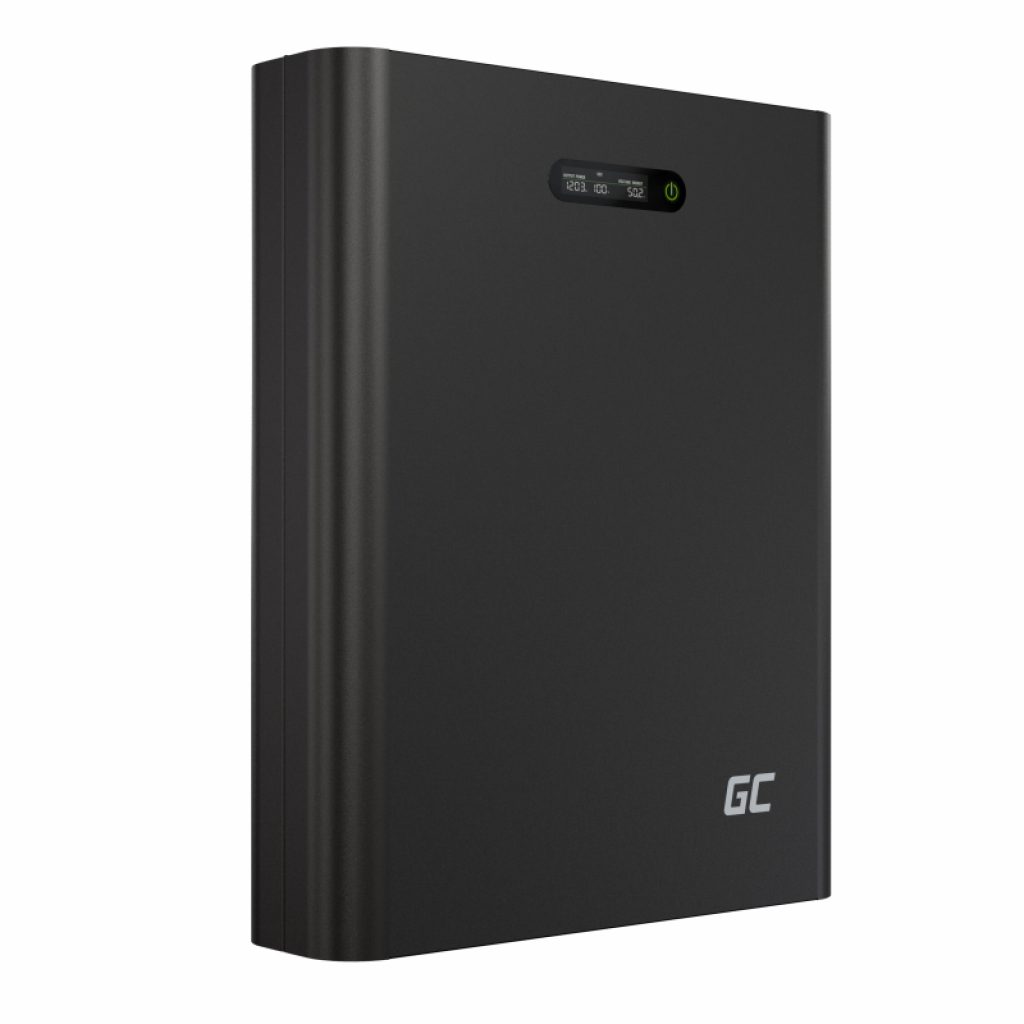
Source: greencell.global
What’s A 5 kWh Battery Used For?
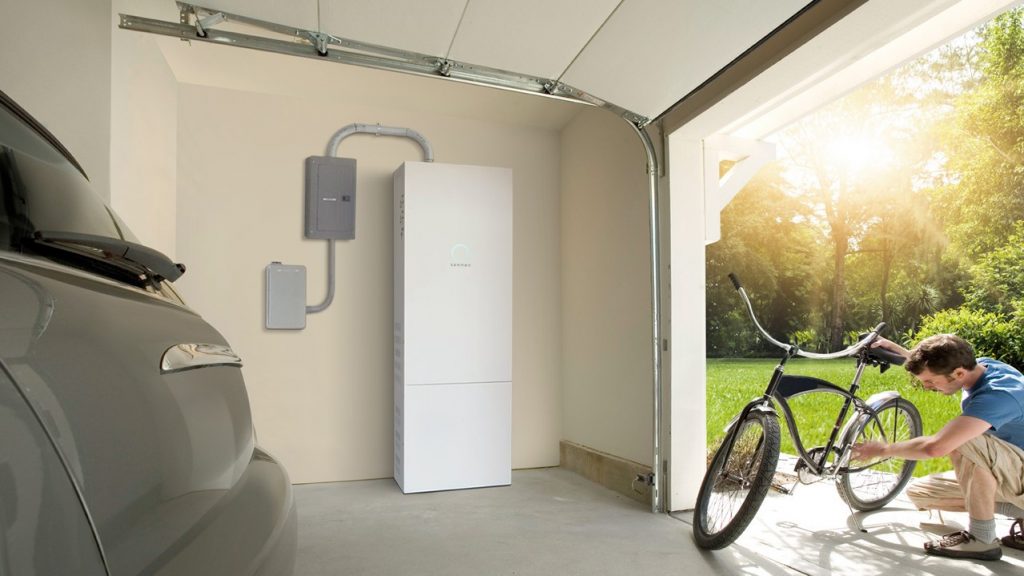
Source: sonnenusa.com
A battery with this energy capacity is usually used for residential backup power purposes or emergencies. For example, those in areas where grid power isn’t so reliable but where power outages don’t last so long (less than a full day).
You can also use a 5 kWh battery to save money on electricity bills. How? You can pair your 5 kWh battery with solar panels (using a charge controller) and store solar energy every sunny day for later use.
By using stored solar energy to power some of your power-hungry appliances, you’d save money by consuming less energy from the grid.
To power home appliances (AC appliances) such as refrigerators, TV, kitchen appliances, power tools, phone chargers, laptop chargers, etc., you’d need to connect an inverter to your battery.
In short, you can power pretty much any appliance or device you have at home with this battery.
How Long Will a 5 kWh Battery Last?
Batteries have two types of “duration.”
One is related to the battery’s cycle life: how many cycles can the battery perform before it is no longer usable. The other one expresses how long one cycle lasts (how long does the battery take to go from 100% SoC to 0%).
Cycle life
It depends on the battery’s chemistry.
However, most 5 kWh batteries are made of LiFePO4 cells. A LiFePO4 5 kWh battery can usually perform around 5000 cycles before its performance starts to decrease considerably.
That’s a lot! If you used one cycle a day, your 5 kWh LiFePO4 battery would last over 13 years.
Most manufacturers claim their LiFePO4 5 kWh batteries last approximately 10 years, and most of them offer a 10-year warranty.
How Long Does One Cycle Last?
A battery cycle is defined as a rechargeable battery’s complete charge and discharge cycle.
In other words, when your battery is full (100% state of charge), and you use its total capacity to power a load, your battery performs a cycle. It goes from 100% SoC to 0% SoC, and you need to charge it before using it again.
How long a 5 kWh lasts (in one cycle) depends on your power demand. For example, if you draw 1kW per hour, your 5kWh battery will last 5 hours.
You can use this formula to calculate running time, given your power demand:
Running Time (h) = Energy Capacity (in this case, 5000 Wh) / Your Power Demand (W)
For this, you’ll need to estimate your power demand.
Estimating Your Power Demand
- Check your appliance’s power rating to know how much power it requires. (Power (W) = Voltage (V) x Current (A) )
- If you’re powering more appliances, add the power ratings of all appliances you’re powering.
- Once you’ve added the amount of power required by every appliance, you’ll know your total power demand.
Now use the formula shown above to know how long will your 5kWh battery last.
Example
Suppose you’re using your battery to power a refrigerator (170W) and a TV (80W). In this case, you power demand is 170W + 80W = 250W. Therefore,
Running Time (h) = 5000 Wh / 250 W = 20 hours
In conclusion, your battery would last 20 hours.
Running Time Chart
We prepared a small chart with the running times of common appliances (using a 5kWh battery).
| Appliance/Device | Power Rating (W) | Running Time With a 5 kWh Battery |
|---|---|---|
| Refrigerator | 170 W | 29 h |
| Medium Size TV | 80 W | 62 h |
| 3 LED lights | 3 x 9 W (each) = 27 W | 185 h |
| Power Tools | 1000 W | 5 h |
| Wifi Router | 15W | 333 h |
| Phone Charger | 10 W | 500 h (~200 charges) |
| Laptop Charger | 60 W | 83 h |
| Medium A/C | 1200 W | 4,2 h |
How Much Does A 5kWh Battery Cost?
The answer, of course, depends on several factors, including the type of battery (chemistry), the brand, and the retailer.
With that said, if you’re really interested in buying a 5 kWh battery, be prepared for a relatively significant investment.
We’ll consider only lithium-ion batteries, more specifically LiFePO4 batteries, for this discussion.
In 2020, the average price of a LiFePO4 battery pack was around 137 USD/kWh for large-scale systems. This price didn’t change considerably in the last 2 years, but it’s expected to drop further in the coming years.
The average price ranges from 300 USD/kWh to 400 USD/kWh for domestic use.
We prepared a table with a few examples of 5kWh batteries and their average prices:
| Brand | Model | Cell Chemistry | Price (USD) |
|---|---|---|---|
| GOODWE | LX U5.4-L | LiFePO4 | $2750 |
| OSM | OSM48100 | LiFePO4 | $1380 |
| Cyclenpo | CYP-48100 | Li-ion | $1120 |
| Green Cell | ESGC01 | LiFePO4 | $3520 |
| Huawei | LUNA 2000-5 | LiFePO4 | $3460 |
| Felicity Solar | LPBF-S | LiFePO4 | $2195 |
| GSL Energy | GSL5000U | LiFePO4 | $1126 |
Considering only the prices shown in the previous table, the average price of a 5kWh battery is $2241. That’s $448/kWh, which is higher than the average price of LiFePO4 batteries.
This number may not be very accurate given our small sample (only 7 different prices), but it gives you an idea of the price range for 5kWh batteries.
How Much Does A 5 kWh Battery Weigh?
It depends on the chemistry of the battery.
With a bit of research, you’ll quickly realize that most 5 kWh batteries are lithium-ion batteries, usually LiFePO4 batteries. Why? Because lithium-ion batteries have a high energy density (they can store/deliver more energy per volume).
The specific energy (amount of energy per kilogram) of LiFePO4 batteries is around 90 to 160 Wh/kg. This means that a 5kWh battery (5000 Wh) should weigh between 31 kg (68 lbs) and 55 kg (121 lbs).
Here’s a small table with a few examples of 5kWh batteries and their respective weight:
| Brand | Model | Weight |
|---|---|---|
| GOODWE | LX U5.4-L | 126 lbs / 57 Kg |
| OSM | OSM48100 | 110 lbs / 50 Kg |
| Cyclenpo | CYP-48100 | 123 lbs / 56 Kg |
| Green Cell | ESGC01 | 110 lbs / 50 Kg |
| Huawei | LUNA 2000-5 | 141 lbs / 64 Kg |
| Felicity Solar | LPBF-S | 97 lbs / 44 Kg |
| GSL Energy | GSL5000U | 119 lbs / 54 Kg |
Considering only the weights shown above (view table), the average weight of a 5 kWh battery is 118 lbs / 53 kg.
This number is compatible with the energy density mentioned for LiFePO4 batteries. Also, wiring, case, and BMS add up to the total weight of the battery.
Is A 5 kWh Battery Enough To Power A House?
In general, no.
But here’s a better answer: it depends on the house’s power demand. If we consider a big home with many appliances, 5 kWh is definitely not enough.
However, if we consider a tiny off-grid house with just a few appliances, 5 kWh can be enough to get you through a day or two.
Another factor worth considering is how you wish to use this battery. If you plan on using this battery only in emergencies/during short power outages to power essential appliances, then 5 kWh might do the trick.
Conversely, if you plan to use this battery regularly to power many appliances, you need an energy storage system larger than 5 kWh.
According to the U. S. Energy Information Administration (EIA), the average energy consumption of a U.S. residential utility customer is 893 kWh per month, which is about 29.8 kWh per day.
Therefore, a 5 kWh battery is not enough to power a house. It will only provide one-sixth of a U.S. home’s average daily energy consumption.
Expandable Systems
The good news is that you can expand your battery system’s capacity by simply connecting more 5kWh battery modules, like so:
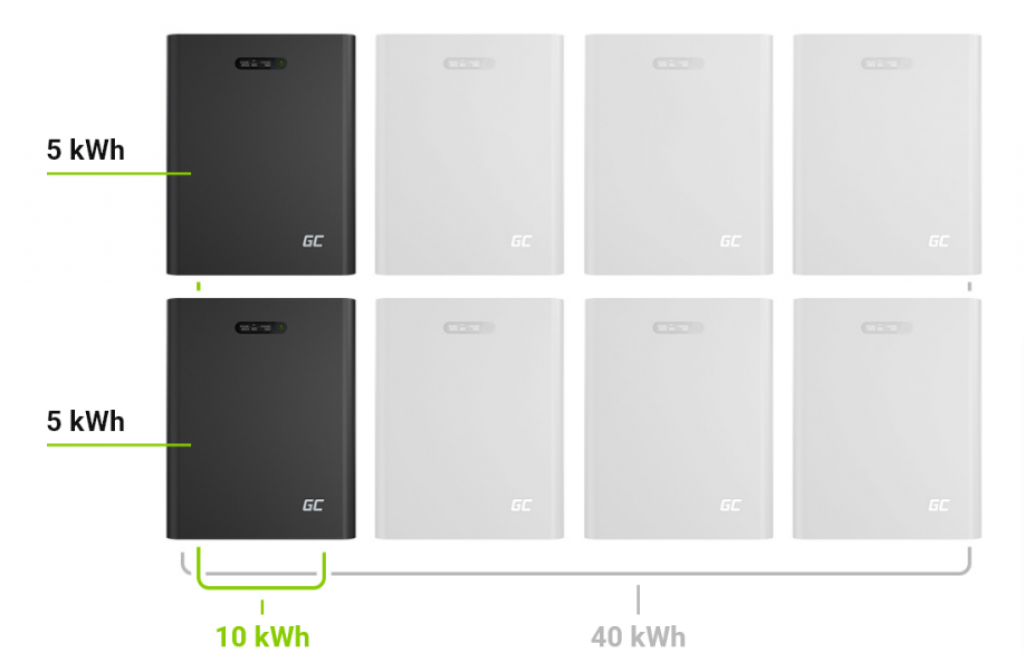
Source: greencell.global
By connecting several battery modules, you can build a 15 kWh, 20 kWh, 30 kWh, or even 40 kWh system, which is enough to power a house for more than a day.
However, before buying one of these batteries, check if they’re expandable modules and how many modules you can pair. Each battery has a module connection limit.
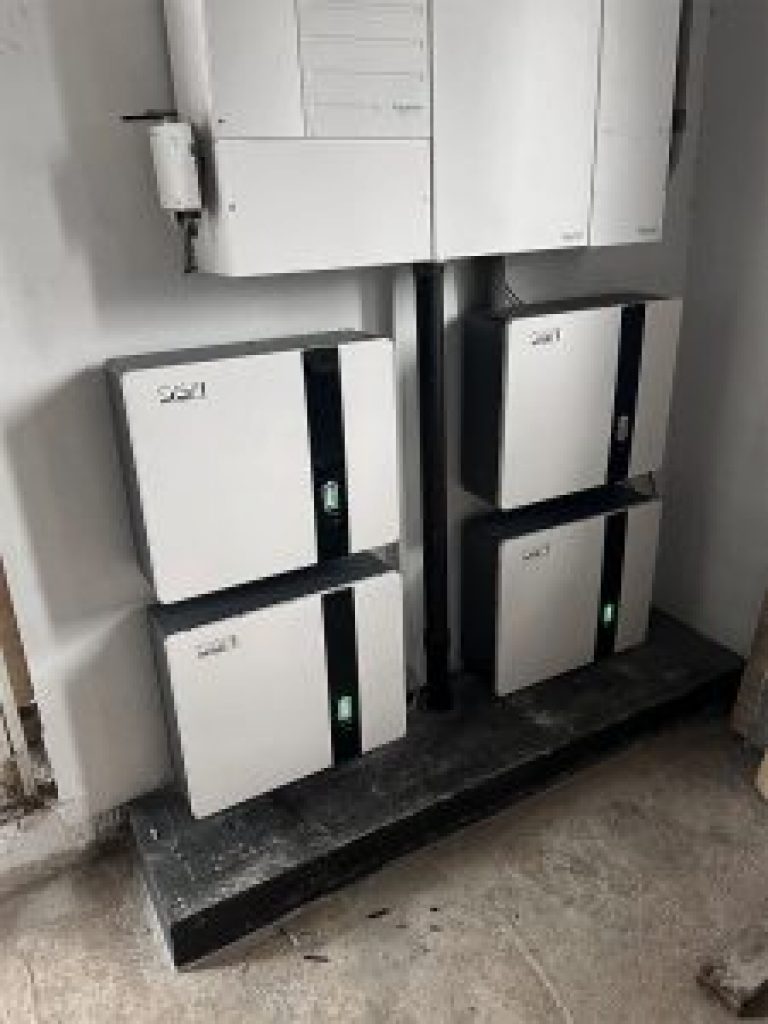
Source: osmbattery.com
Final Thoughts
A 5 kWh battery is an excellent option for a relatively affordable and lightweight energy storage solution. It’s also perfect for people who want to reduce their carbon footprint by using green energy sources.
This battery can provide backup power for essential appliances during a power outage or be used to store solar energy during the daytime so you can use it at night.
Before purchasing a 5 kWh battery, make sure to do your research. This way, you’ll avoid spending unnecessary amounts on your battery, and you’ll be able to maximize its performance and cycle life by using it correctly.

